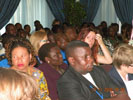
In Bukavu, South Kivu, I attended a conference on the protection of witnesses and victims in cases of sexual violence. The two-day event, organized by Rejusco, brought together police, NGOs, judges, lawyers, academics, civil society, and experts from abroad. It provided a forum for actors involved in the same issues to discuss common problems. But it was also an opportunity for Congolese to speak out about the frustrations they face with international organizations acting on Congolese soil.
As one individual said, “There is no justice if there is no justice for victims.” But the protection of victims and witnesses in eastern Congo raises more than one concern. First, there is the lack of a reliable security apparatus—so much so that even judges at the conference raised the issue of their own protection. Because of financial limitations, the transportation and appropriate infrastructure that would enable the anonymity of closed door sessions are not available.
A representative of Heal Africa, who said over 5,403 cases of sexual violence have been reported since January 2009, underscored the slowness of justice for victims of violence. Some court cases have been waiting for over two years and have yet to be dealt with. In cases of sexual violence, time is particularly of the essence. Evidence based off of medical examinations need to be handled soon after the act of aggression to be considered credible.
Experts from South Africa, the ICC, and Rwanda presented ways used by their country or institution to protect victims. While some examples may have been inspiring to Congolese actors, others were received with a certain degree of animosity. Many claimed that the solutions offered are not applicable to the Congo, an environment that is wholly different—an assessment that is not entirely wrong since Congo has its own cultural beliefs and has suffered from a conflict for many years.
Locals criticize international NGOs for trying to replace pre-existing institutions—a solution that is not at all viable in the long-term. But, the truth is, there is a lack of institutions and civilians need some kind of mechanism to protect them in the meantime. However, NGOs must draw the line somewhere. International organizations should, for instance, not have the right to define who is a victim—only judges should be able to do that. One recommendation offered at the conclusion of the conference was to create a consultation framework between all the actors involved in cases of sexual violence, including doctors, judges, NGOs, social services etc. At the end of the day, only the reinforcement of these kinds of civil society initiatives and national institutions can truly and sustainably reform Congo’s justice sector.
The issue with conferences lies not in the events themselves—everyone is generally happy to speak out on the issues—but in its aftermath, when it’s time to follow up on recommendations and few have the capacity or the willpower to implement what all agree is needed. Hopefully, the desire for change I saw at the conference will actually translate into actions in the months to come.
Photo: Conference on the protection of victims and witnesses in sexual violence in cases in Bukavu, Congo. (Enough/Olivia Caeymaex)

